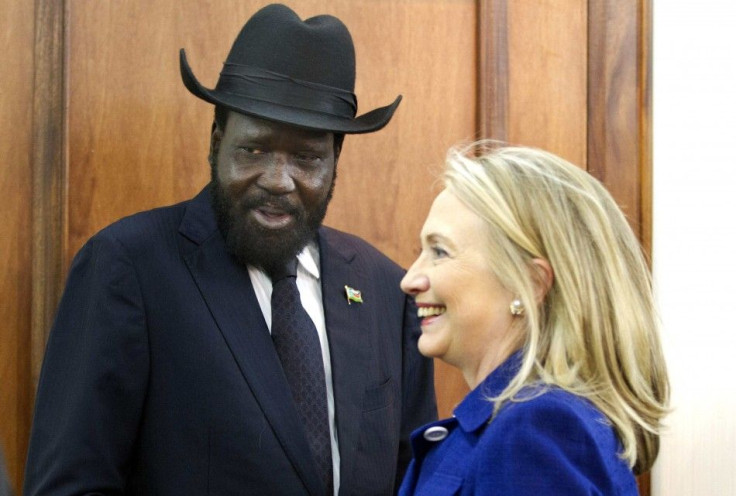Hilary Clinton In Africa: Urges Sudans To Establish Peace; Blasts Chinese Intervention

Secretary of State Hillary Clinton arrived in South Sudan on Friday, as part of her seven-country tour of Africa that began earlier this week. She is the highest ranking U.S. diplomat to visit South Sudan in its one-year history.
Speaking in the capital Juba, she congratulated the young country on its anniversary and urged South Sudan's President Salva Kiir and Sudan's President Omar Hassan al-Bashir to work for a compromise to the conflict between the two Sudans.
The countries have been in a dispute over border security and oil since South Sudan broke away a year ago. South Sudan inherited the majority of the region's oil fields, but the pipelines to export the oil run north through Sudan. The hostilities and escalating violence have brought the two nations back to the brink of war.
The UN set a deadline of Thursday, August 2, when Sudan and South Sudan were supposed to reach an accord, but just before Clinton's arrival the Security Council has extended the deadline to next Thursday. Failure to meet the deadline could result in sanctions on both countries.
"While South Sudan and Sudan have become separate states, their fortunes and their futures remain inextricably linked," Clinton said, according to the BBC. "Both countries will need to compromise to close the remaining gaps between them."
"This is a delicate moment...Now we need to get those (oil) resources flowing again," Clinton told reporters after meeting South Sudanese President Kiir for more than one hour in his office, according to Reuters.
"A percentage of something is better than a percentage of nothing,"
Jennifer Christian, a Sudan Policy Analyst at the Enough Project and former legal advisor to the government of South Sudan, said that Clinton's visit is "extremely encouraging" for progress between the two countries.
"Quite frankly, the governments of Sudan and South Sudan are not going to conclude an agreement without international and U.S. applying pressure on both sides to really come to the table and negotiate in good faith," Christian said. "Putting pressure on could move the parties forward to sign an agreement."
Christian also said that Clinton's show of support for the South Sudanese government was significant.
"The government of South Sudan sees itself as trying its absolute hardest to come to some resolution," she said.
"I think the Secretary's show of support today and her respect for the South Sudanese and its conduct over the past year is very important."
Dr. Charlie Clements, the Executive Director of the Carr Center for Human Rights Policy at the Harvard Kennedy School of Government, also hoped that Clinton's presence might push the two countries toward a compromise.
"South Sudan is one of the poorest countries in the world. It's one of those countries that can't afford any more conflict," Clements said.
Clinton's visit, he added, "will add urgency to the matter, and hopefully spur the UN as a facilitator and the two countries to an agreement."
Clinton's next stops after South Sudan will be Kenya, Malawi, South Africa to meet with Nelson Mandela, and Ghana. At her first stop in Senegal, Clinton voiced criticism of China's growing economic involvement in Africa, and, without actually mentioning China, and warned African leaders away from collaborating with Chinese companies.
In the speech, in an apparent reference to China, Clinton said: "The days of having outsiders come and extract the wealth of Africa for themselves leaving nothing or very little behind should be over in the 21st century."
The speech has drawn the ire from Chinese commentators. The BBC quotes the Chinese news agency Xinhua as wondering "Whether Clinton was ignorant of the facts on the ground or chose to disregard them, her implication that China has been extracting Africa's wealth for itself is utterly [far from] the truth."
China became Africa's biggest economic and business partner in 2009, and has been accused of continually ignoring human rights abuses and of not conducting business that is beneficial to the host continent.
© Copyright IBTimes 2025. All rights reserved.






















